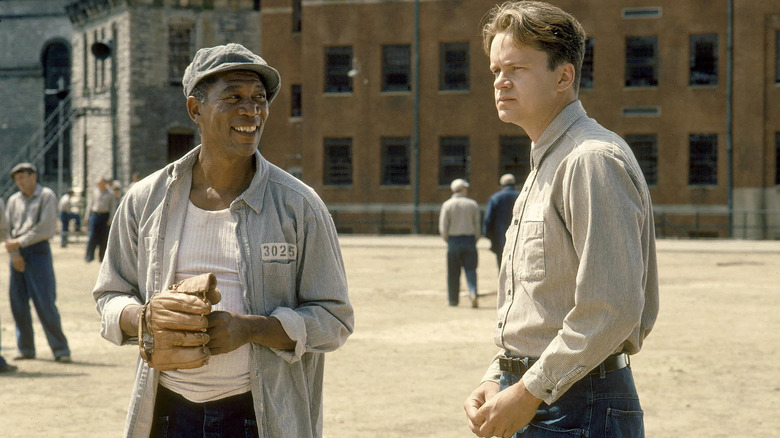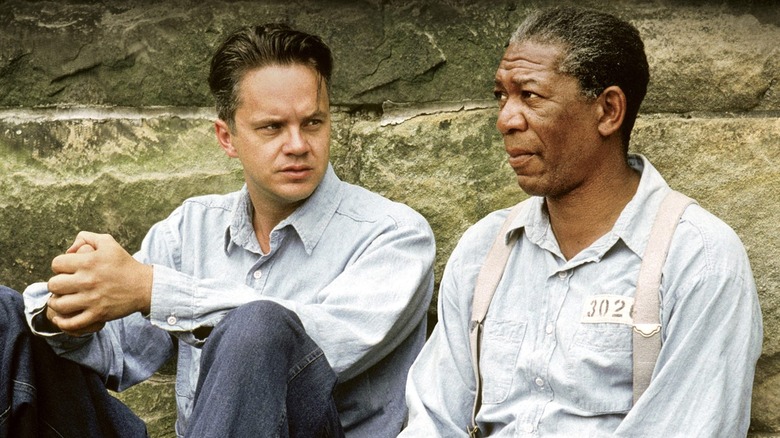Why Stephen King Thought His Best Movie Adaptation Would Never Get Made
There are a lot of candidates for the title of Best Stephen King Movie Adaptation, from Stanley Kubrick's take on "The Shining" to Rob Reiner's 1986 classic "Stand by Me." But it's clear that the most popular of them is "The Shawshank Redemption," written and directed by Frank Darabont in 1994. It's a movie that's not just beloved, it's literally the number one rated movie of all time on IMDb.
King himself was always a fan of Darabont's adaptations. Unlike with Stanley Kubrick, there were no major, irreconcilable creative differences between Darabont and King. Even when Darabont made a major change to the source material, like with controversial ending to "The Mist," King wasn't mad. Instead, he was jealous that he hadn't thought of the idea first. Even Darabont's first-ever adaptation of King's work, the little-known 1984 short "The Woman in the Room," was impressive to the renowned author. In a 2014 piece for Oscars.org, King described that early short film as "short but extremely moving," with a strong "feel for 'regular people.”'
Darabont had no trouble getting King's blessing to adapt his 1982 novella "Rita Hayworth and the Shawshank Redemption," but King was skeptical that the upstart director could pull it off. "It was too textured and novelistic," King explained. The apprehension made sense: King's novella was a surprisingly quiet, meditative story. Whereas a book like "Carrie," with its striking imagery of a prom queen drenched in pig blood, seemed like it was begging for a cinematic adaptation, "Shawshank" seemed like a story best suited for its original medium. Perhaps the biggest hurdle was the way the story was told from Red's point of view; a faithful movie would have to use a lot of narration, and voiceovers aren't always received well by the audience.
Happy to be proven wrong
Luckily for Darabont, he'd managed to snag Morgan Freeman as Red. This is the character in the novella who narrates everything, and because it's scientifically impossible to dislike Freeman's voice, the movie gets to keep that aspect of the book without the narration overstaying its welcome. It also helps that, in a visual medium like film, there doesn't need to be as much time dedicated to how Red knows about any particular thing that happens when he's not in the room. The novella's filled with longwinded explanations about how Red heard about X from Y, but simply by showing us each scene, the viewer's able to just assume that Red found out about it later.
The movie also benefitted from its ability to show us scenes that were denied to us in the novella — particularly, the moments where the corrupt villains, the warden and Captain Hadley, realized how screwed they were. In the book, you were forced to imagine how they got their comeuppance; the movie actually lets you see it. In the end, "The Shawshank Redemption," was not just a movie that stayed largely faithful to its source material, but actively improved on it with the few changes it made.
"When I first saw it, I realized he'd made not just one of the best movies ever done from my work, but a potential movie classic," King explained. He wrote about how Darabont had been worried about Tim Robbins's old age make-up in the final scene, and how King had assured him, "People aren't going to notice the makeup, because they'll be crying." Sure enough, that final sequence of "Shawshank" is a total cinematic triumph, one of the best things to come out of both King and Darabont's long, fruitful careers.

